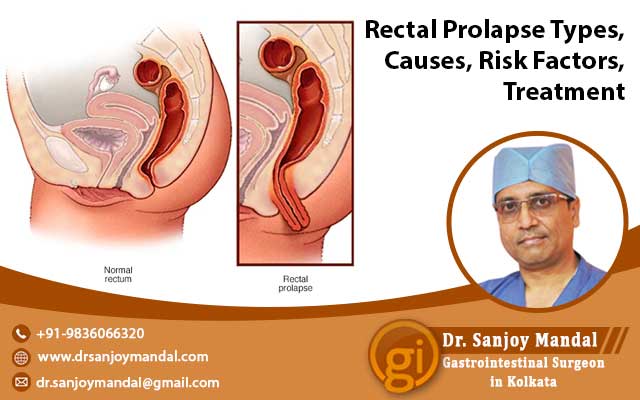Overview
The last portion of the large intestine is called the rectum and the opening of the rectum through which the stools exit is called the anus. The condition in which a person’s rectum starts to push through the anus resulting in discomfort is known as rectal prolapse. Women above 50 are more prone to the condition than men. According to the best laparoscopic surgeon in Kolkata, Dr. SanjoyMandal, the treatment of rectal prolapse depends on the severity of the condition. Nonsurgical treatment can cure mild rectal prolapse, but in severe cases, laparoscopic surgery is essential.
Types
There are mainly 3 types of rectal prolapse. The types are divided depending upon the movement of the rectum. The types are as follows:
- Internal prolapse: In this condition, the rectum begins to drop but is yet to push through the anus.
- Partial prolapse: This condition takes place when only part of your rectum moves through the anus.
- Complete prolapse: In this case, the whole rectum extends out through the narrow space of the anus.
Cause
Rectal prolapse can be a cause of many medical conditions.
- The anal sphincter is the muscle that helps stools to pass from the rectum. In most cases, the muscle weakens during pregnancy or childbirth. With age also this anal sphincter muscle becomes weak and as a result, rectal prolapse occurs.
- Constipation: If you are a sufferer of chronic constipation, the strain that you put while passing the stool makes your rectum move down from its usual location. If you have been practicing to put this strain during your bowel movement for over a year, you may have rectal prolapse, says Dr. SanjoyMandal, a top laparoscopic gastrointestinal surgeon in Kolkata.
- During pregnancy or difficult vaginal birth, a woman’s nerves which control the anal and rectal muscle, get damaged. As a result, rectal prolapse takes place. The nerve damage can also happen due to some surgery in the pelvic portion or a spinal injury.
Risk factors
Some conditions increase your risk of getting a rectal prolapse. Those are as follows:
- If you are a sufferer of parasitic infections, you may be prone to rectal prolapse.
- Chronic obstructive pulmonary disease contributes to the risk of rectal prolapse.
- The best laparoscopic surgeon in Kolkata says that if you have diabetes, you may get a rectal prolapse.
- Cystic fibrosis and a hysterectomy also make you prone to the risk of getting a rectal prolapse.
Treatment
Rectal prolapse does not heal on its own. An untreated rectal prolapse can get severe day by day. Laparoscopic surgery is the only treatment option to get rid of rectal prolapse permanently. So, if you find a bulge at your anus and find it difficult to sit properly or to control the bowel, consult Dr. SanjoyMandal as early as possible. In worst cases, you may also suffer from bleeding from the rectum. Visit a top laparoscopic gastrointestinal surgeon in Kolkata to avoid such situations and get your rectal prolapse operated on.
